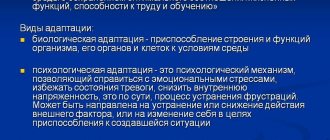Article:
In any society there are people who violate the norms of society, go against the rules and moral principles.
In this article we will understand what deviant behavior means and what are the reasons for its occurrence. Deviant behavior is human behavior that deviates from generally accepted norms of society. This behavior differs from the generally accepted one in its motives, values, ideals and means of achieving one’s own goals.
For example, such people may not say hello when meeting, have an “interesting” appearance, act out, or take innovative or revolutionary actions. Young people, saints and geniuses, revolutionaries and mentally ill individuals are most susceptible to this behavior. The behavior of such people, to one degree or another, disrupts the stability of social relationships in the family, on the street, in the team and in society as a whole.
You need to understand that deviant behavior may be the norm for one society or social group, but a deviation for another. It can also be positive and negative.
T. Parsons identifies two types of deviant behavior depending on a person’s attitude towards other people:
- The first type of personality seeks to dominate and subjugate people. This is a manifestation of deviant motivation, which is often observed in criminal gangs.
- The second type of personality submits to other people, makes concessions, or adapts to stronger and more active individuals. So, for example, a whole deviant society was formed under the leadership of Stalin.
There is a broader classification of such behavior developed by Merton. The typology is based on a person’s attitude to standards, their values, and needs. He identified the following types of deviant behavior:
- Total conformism (normal behavior) . This is a person who accepts the norms of society, gets an education, has a job, moves forward, thereby realizing both his own and social needs.
- Innovators are people who agree with the goals of their activities, which are approved by society, but at the same time do not follow generally accepted means of achieving goals. They come up with new and innovative means of achieving goals. For example, these are people who engaged in the privatization of state property, the construction of financial “pyramids”, and “racketeering”. This is precisely the type of deviant behavior that often has a positive connotation. These are the engines of progress.
- Ritualists are people who take the norms and principles of society to the point of absurdity. They demand compliance with all written rules and often go on strike.
- Retreatism means escape from reality. These are people who reject goals and ways to achieve them. This includes homeless people. Alcoholics, drug addicts, monks.
- Revolutionaries are people who reject outdated goals and replace them with new ones.
As can be seen from the above, deviant behavior also has positive manifestations. Thanks to revolutionaries and innovators, society abandons outdated values and goals and moves forward.
How deviant behavior manifests itself
Schoolboy
- fights too often;
- hooligans;
- cruel to peers or animals;
- spoils other people's things;
- sets something on fire;
- steals;
- often lies;
- skips school, violates school rules;
- leaves home, wanders;
- behaves defiantly, deliberately provokes other people into conflicts.
Deviation can be of two types. The first includes such violations that imply criminal liability, in other words, criminal. In this article we will not dwell in detail on this particular form; the subject of the article will be manifestations related to the second type - violations as a result of distortion of social attitudes that do not imply criminal liability, as well as deviations due to learning difficulties and an unfavorable family environment. Most often, the prerequisites for the appearance of such deviations are formed in childhood and become fixed in adolescence.
Reasons for deviant behavior
A deviation can be formed as a result of initially given organic reasons or as a result of violations in the process of development and education. Initially predetermined causes include genetic developmental defects, birth injuries, disturbances in the formation and development of various systems and functions of the body (intellectual development, features of mental operations, etc.). These reasons create conditions for the occurrence of disorders (for example, in hyperactive children, mentally retarded, autistic). But, more often than not, they only determine the risk group for the development of social deviant behavior in children and adolescents. A student may not have any problems with discipline, but at the same time have such developmental disorders. Moreover, under subjectively difficult stressful conditions, such a schoolchild or teenager may begin to behave in a way that falls under the definition of a deviant child. Risk conditions can be associated with various areas of life.
In the family it is:
- antisocial character of the family as a whole or of its individual members: marginal lifestyle of parents, alcoholism, drug addiction, etc.;
- single-parent family or severe disruption of the relationship between parents;
- violations in the style of family upbringing (such as hyper or hypoprotection, family idol, etc.);
- physical or psychological violence in the family (both in relation to children and in relation to other family members, which children witness).
At school it is:
- priority in ensuring the personal authority of the teacher at any cost (including through humiliation and insults of the child);
- the complexity of tasks exceeds the student’s real capabilities (interest in learning and knowledge is lost, the teenager is looking for other ways to assert himself and compensate for his own failure);
- it is difficult for a student to find his place in a team, or the team chooses him as a means of solving their own socio-psychological difficulties, and this can be expressed in boycotts, ridicule, and bullying.
If any of the listed reasons are present, then the process of forming and consolidating the psychology of deviant behavior looks like this: 1. The student does not know how to behave in new, unusual conditions. The methods known to him do not help, and he has not yet learned new ones or does not know how to behave differently. 2. The student tries to build relationships with others, but his attempts are not successful. As a result, he becomes exhausted, becomes convinced of his failure and is not confident in his abilities. At the same time, his anger towards what is happening appears and grows, and this already pushes the little personality to violate the rules accepted in society. 3. The situation becomes psychologically unbearable for an immature person, and she does not know how to resolve it in an acceptable way. 4. Further deviation from the norm can be formed in one of two ways. Or the student commits unacceptable actions and at the same time understands the incorrectness of his reaction. In this case, he experiences a feeling of guilt, his self-esteem becomes low and the teenager finds himself in a situation of increasing psychological stress. As a result, various psychological disorders (neuroses, psychoses) may arise that require qualified help. Or the teenager commits negative actions and at the same time justifies them. He does not have an internal conflict in connection with the way he behaves; he acts with the aim of obtaining benefits or increasing self-esteem, position among peers, and self-affirmation.
Forms
There are several types of deviant behavior. All of them should be taken into account so as not to accidentally find yourself in a difficult situation. Forms of deviant behavior deserve close attention because they affect the behavior of an individual and shape his future. Let's look at the most common options. Many people know about them, but do not correlate them specifically with manifestations of deviation.
- Addiction. Because it can be considered a disease and not just a bad habit, it destroys all individuality. A drug addict cannot be a good family man, nor a worthy brother, son or husband. This contradicts the concept of family and its eternal values. Even if at the very beginning of his “hobby” a person joked cheerfully and stated that he could quit at any time, as a rule, this does not happen.
- Alcohol consumption. This form of deviant behavior, unfortunately, is familiar to many firsthand. Alcohol use harms not only individuals, but also society as a whole. As a result, families collapse, and there is a feeling of precariousness and instability in the outside world. In a family where one or both parents drink, the child cannot grow up to be a full-fledged person. A certain psychological trauma will be received, mistrust, rejection and hostility will form. Some young people are so traumatized that they are then afraid to get married, although they begin an independent life early.
- Crime. Any form of crime contributes to the corruption of the soul. A person stops appreciating those around him and treats people as things that do not deserve attention. All highly spiritual values are trampled, forgotten, rejected. Manifestations of crime can be different - theft, premeditated murder, theft. One thing is inevitable - society condemns such acts.
- Prostitution. It is no coincidence that selling one's body is considered a crime against morality. Human morality comes into question.
- Suicide. Suicidal tendencies cannot be considered natural for a person. It is normal when a person, on the contrary, tries with all his might to save his life. It is not normal to have a desire to say goodbye to life even in the face of serious shocks. Love for life is what defines us and makes us take active steps.
Types of teenage aggression.
Prevention of deviant behavior
To prevent the development of deviations in children and adolescents, parents need to pay attention to both the family attitudes and upbringing models adopted in their family, and the psychological atmosphere surrounding their child at school or kindergarten. It is important to create an atmosphere of acceptance, understanding and security in the family. At the same time, it is necessary to ensure clarity of boundaries and rules in the family: what is prohibited in our family, and what is permissible in our family is allowed. It is important that parents have a clear understanding of the principles on which they are raising their children, what goals they are trying to achieve, and whether their methods of achieving educational goals are effective and whether they do not cause more harm to children. It is equally important that family rules are communicated and explained to children, because only understanding will ensure that children ultimately adopt these rules as their own. Otherwise, incomprehensible rules and double standards imposed by force cause a desire to break them in every case when punishment can be avoided. It is also necessary to take into account and clarify the motives of the little person’s behavior in order to avoid unfair punishment in cases where he was driven by an understandable desire to protect himself, perhaps in a not entirely constructive way. In this case, the main goal of the parents is to understand what happened and help him choose socially acceptable ways to regulate relationships. It is also very important to provide a girl or boy with a person-centered approach in educational institutions, at least by choosing a school with appropriate values and principles of education. Flexibility in relation to educational opportunities will help to avoid situations of chronic failure and will allow the student to adequately assess his contribution and responsibility in educational activities. Parents can provide great assistance to children in the development of emotional and social intelligence by explaining the emotional states of them and other people in interaction situations: what a person feels, why he reacts in this way, how the situation could be resolved in a better way, etc. Children and adolescents need to name their states and expand their experience in building relationships with other people. A teenager with developed social and emotional intelligence is less susceptible to irritability and impulsive behavior, is emotionally more stable and his adaptive capabilities are higher - which means that in a new and difficult situation for him, he is less at risk of reacting in a disturbed way.
Correction of deviant behavior
Due to the fact that the causes of behavior disorders in children and adolescents lie in different areas of their lives, both family and social development of the child, an integrated approach is required to correct them. It is important to evaluate the boy or girl for biological reasons for deviant behavior and, if present, provide adequate treatment. It is also necessary to review the methods of upbringing in the family, established models of interaction between adults and younger family members. Here, consultations with a family and child psychologist will provide invaluable assistance, since it is within his competence to see and help correct those aspects that, due to their familiarity and routine, may be invisible to parents. Children and teenagers often find themselves in difficult situations simply because they lack social skills and abilities. They do not know how to respond to provocation, how to communicate their dissatisfaction and disagreement in an acceptable way, and become upset and angry when other people's reactions go against their expectations. To develop such skills, on the advice of a psychologist, role-playing games are used, creating difficult social situations and allowing a young person or deviant teenager to find new ways of interaction in the “laboratory conditions” of the game, in a supportive atmosphere. The student receives feedback on his ways of interacting with adults and peers and learns to understand how his actions and actions can be reflected in the reactions and behavior of other people. In group or individual sessions with a psychologist, children learn how they can satisfy their needs for self-expression without causing harm to other people and themselves, and also gain skills in socially acceptable behavior. With the help and support of a specialist, the “difficult teenager” consolidates new abilities and finds the strength and opportunity to transfer the acquired skills from a learning and gaming situation to a real life environment. Deviant behavior of children and adolescents causes a lot of strong feelings among parents and teachers, a lot of anger, fear, and indignation. However, a person with disrupted behavior often suffers from the inability to solve difficult life situations for him in a socially positive way. Often deviant behavior is a cry for help, a signal that the student is experiencing serious trouble and needs support. Try to hear this call and seek help in a timely manner for your children and yourself!
If you or your children need psychological help, call tel. and make an appointment with a psychologist in St. Petersburg!
Pathogenesis
The course of deviant behavior in adolescents is quite complex. Deviations develop due to a violation of the child’s orientation in the system of social values, norms and rules.
If during the age crisis, when the needs of self-determination and self-expression are heightened, there is no stable system of values, high-quality social conditions and support from a close circle of people, then the teenager develops pathologies of behavioral deviations. During this period, illegal and immoral actions are dictated by the desire to attract attention, to prove one’s strength, independence and significance, and independence.








